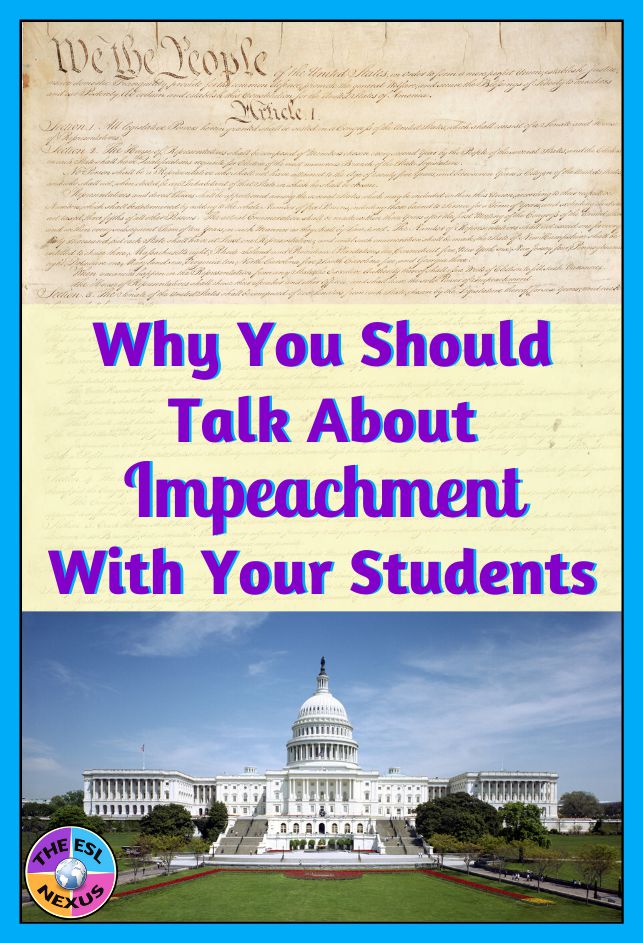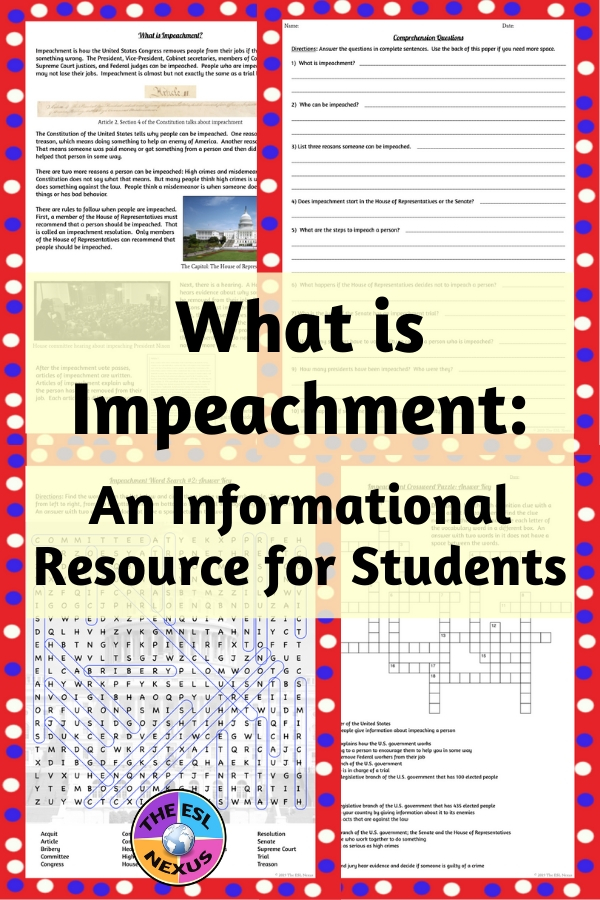It is hard to escape politics these days. Brexit in the United Kingdom, impeachment in the United States, democracy protests in Hong Kong, upcoming elections again in Israel, mass protests in Chile and India – all provide numerous opportunities for teachers to discuss current events with their students. And all too often, students want to know what their teachers think about the political situation where they live.
But should teachers share their personal opinions with their students? A couple years ago, before the 2016 Presidential election in the U.S., I wrote a blog post discussing this topic. Basically, I said teachers shouldn’t divulge their opinions and I presented reasons why. You can read my post HERE.
 |
| ELLs & other students should learn about impeachment; source: The ESL Nexus |
Since then, people’s political opinions in the U.S. and elsewhere have only hardened. I think it’s even more important for teachers to remain neutral in their classrooms; that is, I believe they should objectively explain what is going on but they should not offer their own opinion about any particular situation. There are too many pitfalls to doing so in today’s polarized climate.
However, precisely because it is hard to escape politics, wherever you are, it is also important for teachers to guide their students and give them tools for rationally discussing current events. I came across this article the other day and it makes a great point: When students engage in well-structured discussions about politics, they are better prepared as citizens to participate in democratic institutions.
Because impeachment is such a momentous event and because many English Language Learners are likely unfamiliar with what it entails, I have created a new resource about it. Click HERE to find out more.
Reasons why you should help your students understand
what impeachment is:
* First, for immigrant and refugee ELLs, the concept
may be new to them since it may not exist in the countries they come
from. Even in the countries that do have impeachment as a way of removing officials, how that is done will differ from the process in the U.S since other governments have different organizational structures.
* Second, impeachment rarely happens so this is a historic occasion. In the history of the U.S, only 2 out of 45 presidents have ever been impeached and less than 20 judges have been impeached.
* Lastly, students may have heard others talking about impeachment,
or seen something about it in the media, and if they know what impeachment means, then they can participate in those
conversations as well. That will help them develop their speaking skills as well as their civic awareness.
 |
| You can get this resource HERE; source: The ESL Nexus |
In the resource, there is a reading passage that explains what impeachment is and how it works. It’s written so ELLs at an intermediate level of language proficiency (and higher) can understand it. Other students may also find it helpful. A glossary is included to provide more support. Comprehension questions are also included. Some impeachment-related words have multiple meanings so there is a task that addresses that. In addition, to help students learn vocabulary related to impeachment, there are 3 differentiated word search puzzles along with 1 crossword puzzle that also has an accompanying word bank. All the student materials are available in a Google Drive version as well if you teach in an online environment.
Given the current state of affairs around the world, it’s imperative that ELLs and all students understand what is going on in the communities where they live. When I was a kid watching the Watergate hearings on TV, I didn’t really know what that was all about. I hope this resource will help you explain what impeachment is to your students so they understand the significance of what is happening now in the U.S.




